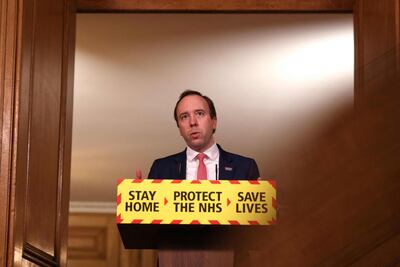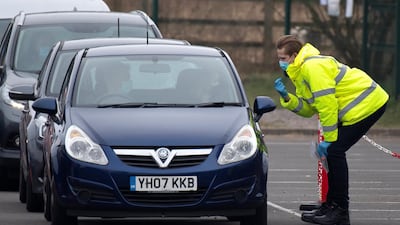The mystery patient in the UK who was infected with the Brazilian coronavirus variant was found, police said on Friday.
Last week, ministers said that six cases of the faster-spreading P1 variant were identified in the UK.
A public appeal was launched after authorities were unable to trace one of those cases, as the person did not provide their contact details on the Covid-19 test document.
Health Secretary Matt Hancock said on Tuesday that the search had narrowed down to 397 houses in south-east England.

"We've successfully identified the person in question," Mr Hancock told a news conference on Friday.
"The best evidence is that this person in question stayed at home and there's no sign that there's been any onward transmission," he said. The person was located in Croydon in south London and testing in the area was increased as a precaution, he said.
The person lived in a household that had recently returned from Brazil, health official Susan Hopkins said.
She set out how they had been tracked down by cross-referencing testing and postal data to produce a narrowed down list of possible candidates, who were then contacted.
Three other cases were identified in Scotland and two in South Gloucestershire, near Bristol in England.
One of the Gloucestershire cases was on a Swiss Air flight LX318 from Sao Paulo to Heathrow, via Zurich, which landed on February 10.
It is not clear how the other patients became infected with the variant first identified in the Brazilian city of Manaus.
A study released this week suggested the strain could spread more easily and reinfect people.
The results of the University of Sao Paulo-Imperial College London study showed the chance of Covid-19 reinfection with the variant was between 25 and 60 per cent.
Blood test samples indicated more than 67 per cent of Manaus’s population had Covid-19 by October 2020.
Scientists were surprised when the city suffered a major surge in cases at the start of this year, despite most of the population having been previously infected.
They believe the new variant emerged in November and quickly became the dominant strain, accounting for 87 per cent of all cases in Manaus within eight weeks.
The variant was found to be up to 2.2 times more transmissible than other coronavirus strains in the city.
Earlier this week, Mr Hancock said the UK's current vaccines were not tested against this variant, but work was under way to tweak the vaccines accordingly.
The UK's medicines regulator said this week it was speeding up the approval process for Covid-19 vaccines to be updated if required.

